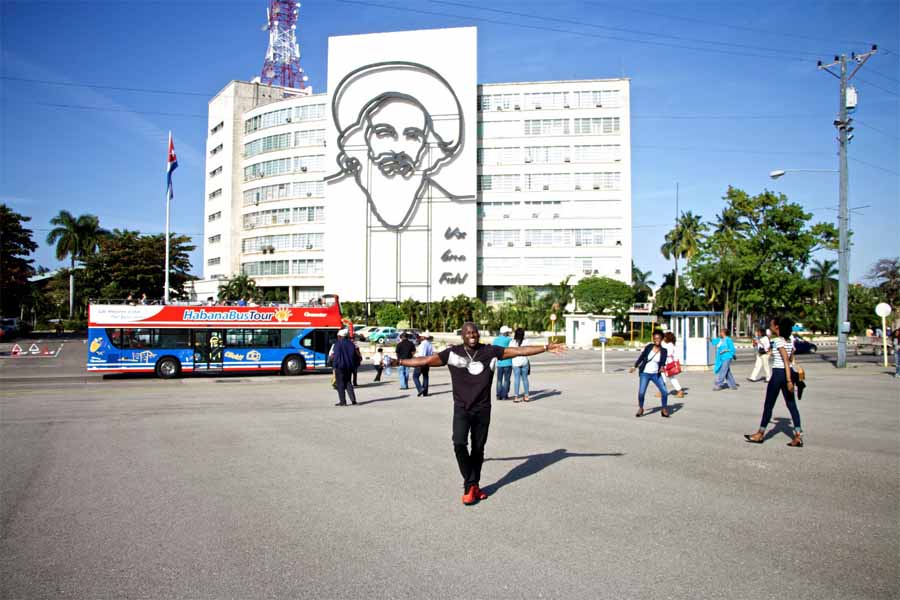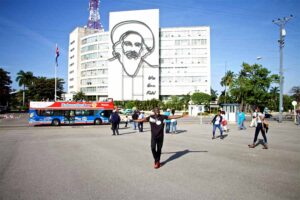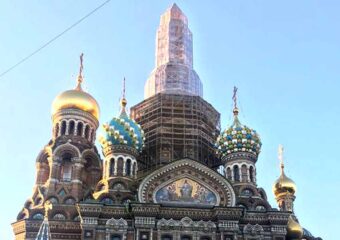OBAMA AND THE POLITICS OF CUBA

On Monday, March 21, Barack Obama, with 800 (yes, 800) investors, legislators and administrators in tow, will take off to Havana Cuba. This presidential visit to the Caribbean island will, for all practical purposes, end the isolation of the Republic Cuba instituted by the US in 1960. A few months after Iran, Cuba will rejoin the free world, the free market economy.
Just one week before the President lands at Jose Marti International Airport, we were leaving the island (the 16th largest in the world), after a six-day visit . Our group numbered 80. After touring the “Gemstone of the Caribbean” in a cultural endeavor, we clearly grasped the urgency and the purpose of what The Economist magazine sees as Obama’s gambit.
When Castro took power on January 1, 1959, upon chasing Fulgencio Batista, he found a few thousand dollars left in the country’s treasury. No one in the United States, or in the Americas, was able or willing to help his revolution. American interests were prevalent in Havana, and Castro’s politics of nationalization did not bode well with US investors on the island. In 1960, America imposed the trade embargo, in an effort to asphyxiate economically the Castro regime. A year later, all diplomatic relations were severed between the two nations.
Castro’s alternative was to jump into the arms of the Soviet Union, then run by Nikita Kruschev. The Soviet leader was delighted to establish a bridgehead 90 miles from the American coast. It may be a fair argument that Kennedy’s inexperience lent to this encroachment of the Monroe Doctrine: “America to the Americans”. The US responded by a strengthening of the embargo, forcing the Soviet to shell up to $18 million dollar a day to sustain the island’s economy.
Jimmy Carter tried a rapprochement with Cuba, the move did not pan out. The pre-revolution Cuban elite, living in Miami, would not renounce to their right of return to the island, to their mansions in Havana’s Miramar neighborhood. The Cuban American National Foundation controlled the politics of Dade and Broward counties. A pro-Cuba policy would immediately lead to a loss of 32 electoral votes at the general presidential election in a major swing state. This threat of a Florida defeat, to all presidential contenders, kept the embargo in place over the next three decades.
The 1989 disintegration of the Soviet Union led to the curtailment of the Soviet aid to Cuba. Famine and despair fell on the Cubans. The regime survived with expediencies, while cracking down on the opposition. Bill Clinton’s attempts toward detente in the 1990s backfired with the Helms-Burton Law that made it even harder for any company, American or not, to trade with Cuba.
Then oil rich Venezuela’s Hugo Chavez came to the rescue. Since then, every Latin American leader criticized the embargo as a proof of American imperialism. Obviously, the isolation of the island and its assignment to the Axis of Evil by GW Bush would not end the Castro regime. It was time to end to embargo. In the dawn of the new millennium, it was a failed policy. But the Cuban American Foundation would not yield. Their dream of a free Cuba, without Castro, endured.
Obama changed the equation. He was the first of nine American presidents, who was born after the incipiency of the embargo. He saw the measure as anachronistic of the Cold War, while America was partnering with Vietnam and China, two of the last four communist countries in the world. Despite a liberal agenda toward Cuba, Obama was able to win Florida twice. The Cuban American Foundation was vanquished. It has further sank into irrelevancy by its inability to deliver Florida to Marco Rubio, the first Cuban American who ever ran for president, during the Republican primaries.
Cuba is one of the five Great Antillean countries. But it is a giant among them. Its surface area is larger of than the combined areas of the four others (Dominican Republic, Haiti, Jamaica and Puerto Rico). Its ecology is pristine. Its people is the most educated in the world (literacy rate: 99.3%). It has the most perfect health system and vital statistics on the planet, better than America, better than the Scandinavians… It is the only poor country with a negative-growth rate population (like Western Europe). It is a land ready for investment. It has a work force prepared to deliver.
While Obama is only confronting resignation from the advocates of the Cuban embargo, he however needs to watch over his shoulder. The competitors are coming. China is all over Africa and South America; Cuba is its next stop. In July 2014, Russian President Vladimir Putin paid a six-day visit to Cuba; he seized the opportunity to write off 80% of the Cuban debt to Russia. Well, one may argue that he is seeking some niceness in return.
The reasons why Christopher Columbus landed in America and Hitler started the Second World War are similar. They were looking for new markets. If Richard Nixon had become President in 1960, Cuba would have never turned communist and fell in the lap of the Soviet Union. If Obama let the Soviet snap a market of 11 million from under his nose, History will not be kind to him.
Yes, the Cuban regime is repressive; yes, it is communist. But so is the Chinese regime. In two years, Raul Castro will step down; the era of the Castros will be over, sixty years after it started. New age Cuba will be ready to usher into the Information Super Highway and open the world to its people… There is nothing more efficient to bring a repressive country into the concert of democratic nations than education and enlightenment… It happened in France in 1789, then many times later. Education and enlightenment work better than an anachronistic embargo.
Obama will be the first sitting American President to visit Cuba, in 88 years, since Calvin Coolidge landed there in 1928. The difference is the visit of the first Afro American President, on the heel of the first Latin American Pope, spells the end of an era… Perhaps the one of the old American cars…
(The Traveller, Saturday, March 19, 2016)
*Join the Travel Club for Friends and Colleagues:
World Travelers Facebook group





